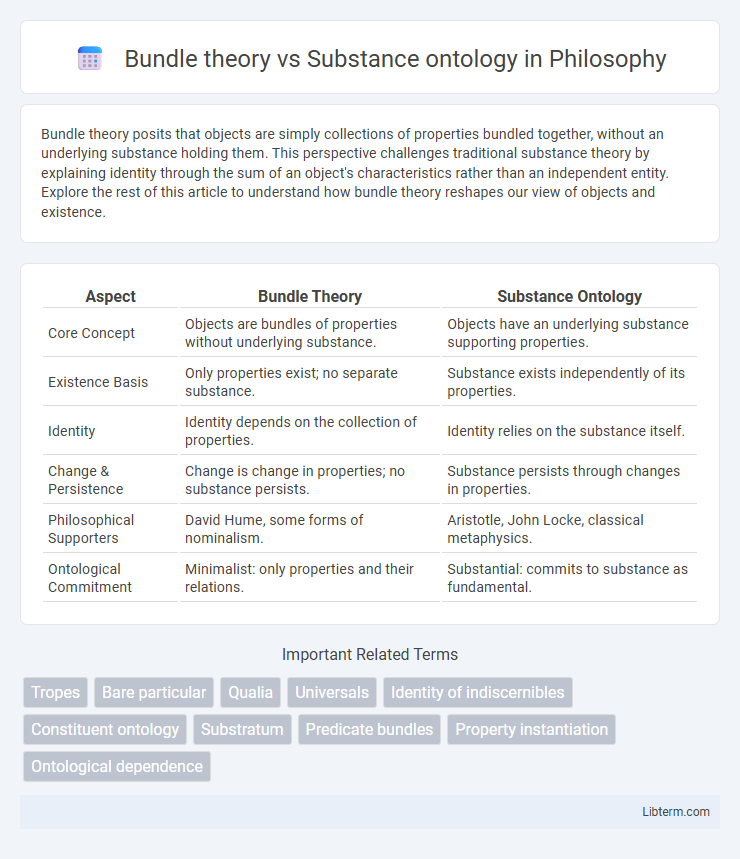Bundle theory posits that objects are simply collections of properties bundled together, without an underlying substance holding them. This perspective challenges traditional substance theory by explaining identity through the sum of an object's characteristics rather than an independent entity. Explore the rest of this article to understand how bundle theory reshapes our view of objects and existence.
Table of Comparison
| Aspect | Bundle Theory | Substance Ontology |
|---|---|---|
| Core Concept | Objects are bundles of properties without underlying substance. | Objects have an underlying substance supporting properties. |
| Existence Basis | Only properties exist; no separate substance. | Substance exists independently of its properties. |
| Identity | Identity depends on the collection of properties. | Identity relies on the substance itself. |
| Change & Persistence | Change is change in properties; no substance persists. | Substance persists through changes in properties. |
| Philosophical Supporters | David Hume, some forms of nominalism. | Aristotle, John Locke, classical metaphysics. |
| Ontological Commitment | Minimalist: only properties and their relations. | Substantial: commits to substance as fundamental. |
Introduction to Bundle Theory and Substance Ontology
Bundle theory posits that objects are merely collections of properties without any underlying substance, emphasizing properties as the sole constituents of entities. Substance ontology, in contrast, asserts that objects have an underlying substance that exists independently of their properties and that properties inhere in this substance. These contrasting views frame fundamental metaphysical debates about the nature of existence and the identity of objects.
Historical Origins of Both Philosophical Positions
Bundle theory traces its origins to David Hume's 18th-century empiricism, which rejects inherent substance and instead conceives objects as collections of properties or perceptions. Substance ontology dates back to Aristotle's metaphysical framework, emphasizing enduring substances as fundamental entities underlying change and property manifestations. The historical divergence reflects contrasting views on the nature of objects: Hume's skepticism about substance contrasts with Aristotle's affirmation of a stable underlying essence.
Core Concepts of Bundle Theory
Bundle theory posits that objects are merely collections of properties or qualities, without an underlying substance that bears these properties. Core concepts include the idea that an object's identity is fully determined by its bundle of co-occurring properties, and that these properties cannot exist independently of the object. This contrasts with substance ontology, which asserts that an underlying substance or essence exists as the bearer of properties, providing ontological grounding beyond mere bundles of attributes.
Defining Substance Ontology
Substance ontology defines entities as fundamentally independent substances possessing intrinsic properties, with substances existing as the primary units of reality. In this framework, objects maintain their identity through an underlying substance that bears properties rather than being mere bundles of properties. This contrasts with bundle theory, which conceives objects as mere collections of properties without an underlying substance.
Key Differences Between Bundle Theory and Substance Ontology
Bundle theory posits that objects are merely collections of properties without an underlying substance, whereas substance ontology asserts that objects possess an underlying substance that bears these properties. In bundle theory, identity is determined entirely by the bundle of properties, while substance ontology holds that substance exists independently and properties adhere to it. The key difference lies in whether properties exist independently or are dependent on an underlying, indivisible substance that constitutes the object's essence.
Major Philosophers and Their Contributions
David Hume significantly advanced Bundle Theory by arguing that objects are merely collections of sensory properties without underlying substance, challenging traditional notions of substance ontology. G.W.F. Leibniz contributed to substance ontology through his concept of monads, indivisible units forming the fundamental substance of reality. John Locke also influenced substance ontology by proposing that substances are umbrellas for qualities, though he acknowledged the difficulty in understanding their true nature beyond sensory experience.
Objections and Critiques of Bundle Theory
Bundle theory faces significant objections regarding the issue of intrinsic properties, as critics argue it cannot account for the existence of objects independent of their features. Critics highlight the problem of "bare particulars," questioning how objects maintain identity if they are merely bundles of properties without an underlying substance. Furthermore, the theory struggles with explaining the unity of an object, where skeptics assert that mere property collection fails to provide a cohesive and persistent entity over time.
Challenges Facing Substance Ontology
Substance ontology faces challenges in explaining the persistence and identity of substances despite their changing properties, leading to difficulties in accounting for the unity of objects over time. Critics argue that substance ontology struggles with the problem of individuation, as it relies on an underlying substance that is often deemed metaphysically obscure or unjustified. These issues have prompted philosophers to explore alternative frameworks such as bundle theory, which conceptualizes objects as collections of properties without assuming a bare substratum.
Contemporary Applications and Debates
Contemporary applications of bundle theory emphasize its utility in modeling complex entities in metaphysics and computer science, particularly in object-oriented programming and ontology design where objects are understood as collections of properties rather than substances with intrinsic identities. Debates often center on the problem of substance persistence and identity, with substance ontology proponents arguing for a foundational substrate that grounds properties, while bundle theorists challenge this by denying the need for a substratum beyond the interrelated properties themselves. Recent philosophical discourse explores hybrid models, attempting to reconcile the strengths of both views to address issues in personal identity, cognitive science, and metaphysical grounding.
Conclusion: Comparing Bundle Theory and Substance Ontology
Bundle theory posits that objects are mere collections of properties without an underlying substance, emphasizing the relations and qualities that constitute identity. Substance ontology argues for an underlying substance that exists independently of properties, providing a core that supports and unifies attributes. The comparison highlights that bundle theory aligns with a more relational and property-based metaphysics, whereas substance ontology upholds an essential substrate, making each framework distinct in explaining the nature of objects and identity.
Bundle theory Infographic

 libterm.com
libterm.com